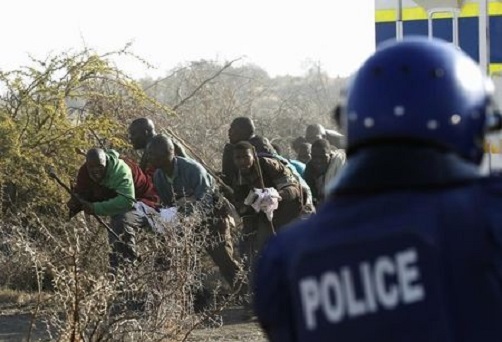
Johannesburg, South Africa | AFP |
South African opposition parties on Tuesday slammed the ruling ANC for failing to deliver on its promises, four years after police killed 34 Marikana miners in a massacre that shocked the world.
“There has been no justice that has taken place for those who died in Marikana,” Mmusi Maimane, leader of the main opposition Democratic Alliance (DA), told reporters.
He was speaking at a rally of thousands of miners commemorating the fourth anniversary of the worst police violence in South Africa since the end of white-minority rule in 1994.
The Marikana mine workers were gunned down on August 16, 2012 after police were deployed to break up a wildcat strike that had turned violent at the Lonmin-owned platinum mine northwest of Johannesburg.
Four years later, nobody has been prosecuted for the shootings, while the miners continue to live in dire poverty.
“It has become quite clear that if you are poor and you are black and you are not connected, this government simply does not care for you,” said Maimane.
His comments come just two weeks after the African National Congress suffered its worst poll results since 1994, losing majority control of the largest metropolitan areas, including the capital Pretoria and business hub Johannesburg.
‘Eating this ANC elephant’
Traditionally an ANC stronghold, residents of Marikana’s Wonderkop township where most miners live instead voted for the radical left Economic Freedom Fighters (EFF) in the August 3 local elections.
“We are going to make sure that our people in this ward get houses, water and electricity,” EFF leader Julius Malema told the crowds at Tuesday’s rally.
“We are eating this elephant called the ANC piece by piece.”
The ruling party was notably absent from the rally.
In a statement released late Tuesday, it said the shooting would “forever leave a blemish in our young democracy”.
“The ANC will continue to work with the Marikana community to build social cohesion,” the party said.
“We urge government to partner with the mines to accelerate the programme of revitalising mining towns, which will prioritise housing, access to services and development of local economies.
“Working together we can transform Marikana into a beacon of hope, in honour of those we lost.”
When rock drill operators in Marikana launched their strike four years ago, they demanded a minimum wage of 12,500 rand ($940).
It is a goal they still haven’t reached, with inflation and the depreciating rand cutting into whatever wage increases they have received.
No one prosecuted
“As we speak today, we are still struggling, we are still fighting for the same demand of 12,500,” said Siphamandla Makhanya, one of the leaders of the 2012 strike.
“Workers have forged closer and closer towards what the others died for — they are closer now than any other time to the 12,500 demand, but that’s the only thing that has changed,” Zwelinzima Vavi, former general secretary of the powerful ANC-allied trade union group Cosatu, told local broadcaster ANN7.
“The squalor, the poverty all over — very little has changed since 2012.”
A lengthy judicial inquiry into the shooting led by retired judge Ian Farlam recommended an investigation into the conduct of then-police commissioner Riah Phiyega, but no-one has been directly prosecuted for the massacre.
“The Farlam Commission has come and gone and yet numerous questions remain unanswered,” Association of Mineworkers and Construction Union (AMCU) head Joseph Mathunjwa told the thousands of gathered miners.
“There are still no answers as to why 500 heavily armed police with artillery and helicopters shot and killed those workers here.”
 The Independent Uganda: You get the Truth we Pay the Price
The Independent Uganda: You get the Truth we Pay the Price



